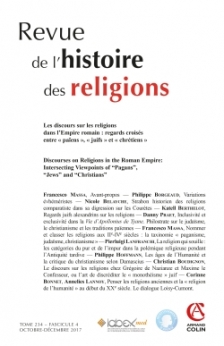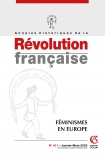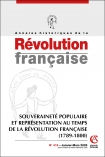
Revue de l'histoire des religions (4/2017)
Pour acheter ce numéro, contactez-nous
Recevez les numéros de l'année en cours et accédez à l'intégralité des articles en ligne.
Nous lions le caractère ouvert du texte à son message religieux et politique. Philostrate laisse au lecteur le choix entre trois statuts ontologiques possibles d’Apollonius : mortel, demi-dieu ou dieu incarné, Protée ? Apollonius accepte les « sagesses barbares » mais, contre la tradition pythagoricienne, refuse le contact avec le judaïsme, critiqué par Euphratès comme incompatible avec les cultes païens. Le christianisme est présent, par des parallèles implicites avec les Évangiles. Hiéroclès a utilisé la Vita pour convaincre les chrétiens de réduire leurs prétentions d’être l’unique vérité et l’unique voie vers le divin. Philostrate avait-il déjà la même intention, par son scepticisme et son attitude ouverte envers
toutes les traditions religieuses acceptant le discours de l’autre ?
We link the open character of the text to its religious and political message. Philostratus leaves it up to the reader to choose between Apollonius’ three ontological statuses : mortal, demi-god or incarnated god, Proteus ? Apollonius accepts the traditions of “barbarian wisdom” but, contrary to the Pythagorean tradition, he refuses any contact with Judaism, criticized by Euphrates as incompatible with pagan cults. Christianity is present through implicit parallels with the Gospels. Hierocles used the Vita to convince the Christians to lower their pretentions of being the only truth and the only way to the divine. Did Philostratus have the same intention by advocating a degree of skepticism and by his open attitude towards all religious traditions that remained open to the discourses of the other ?

